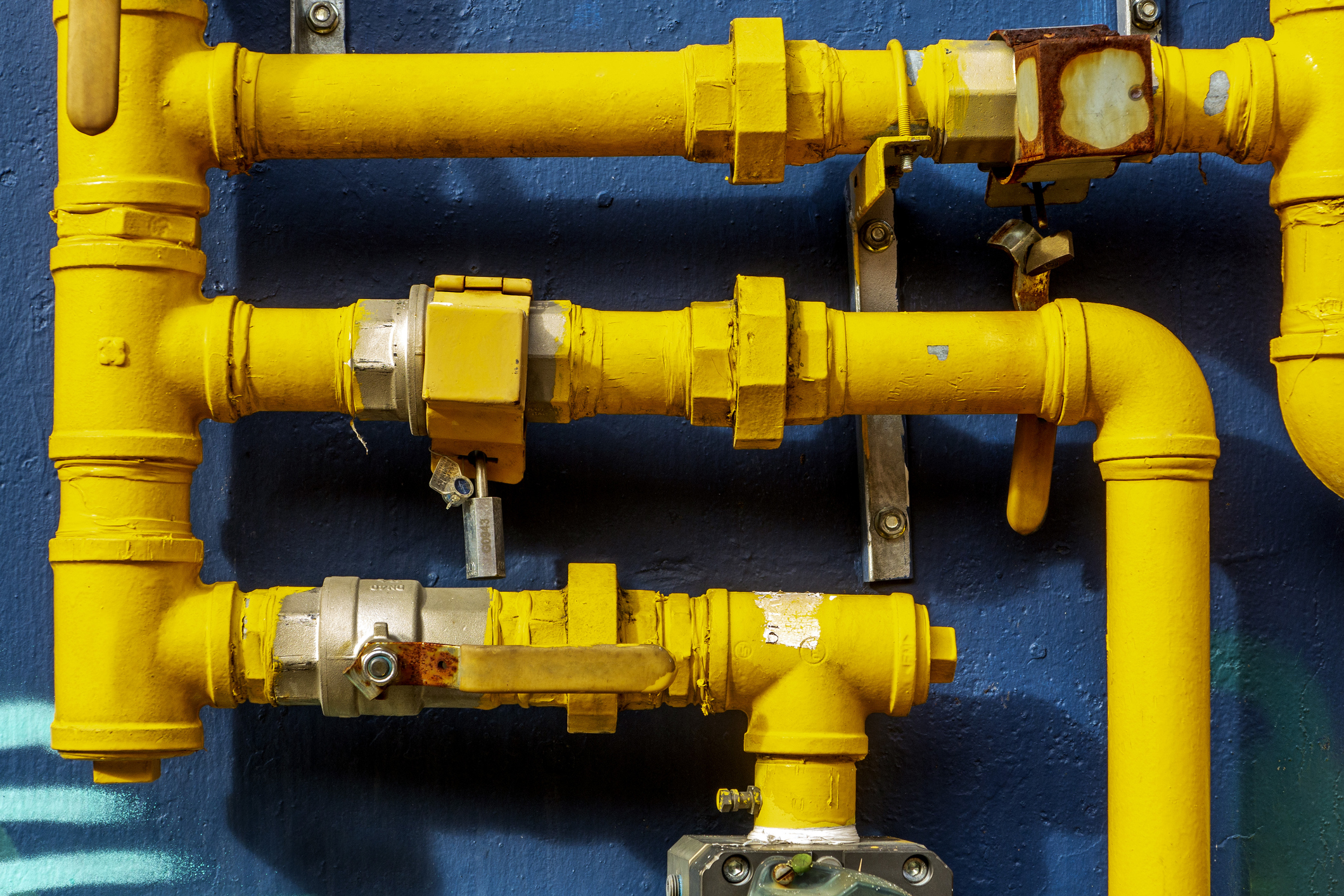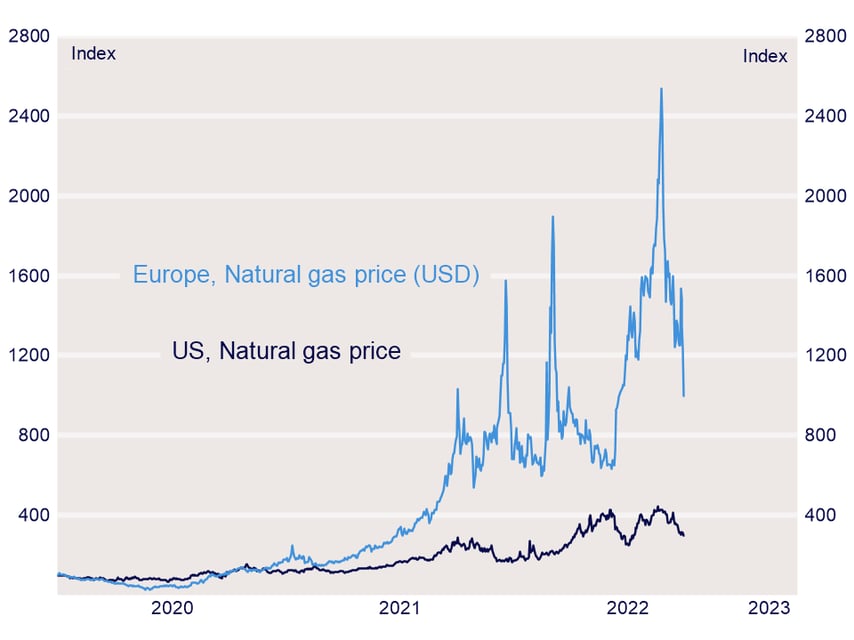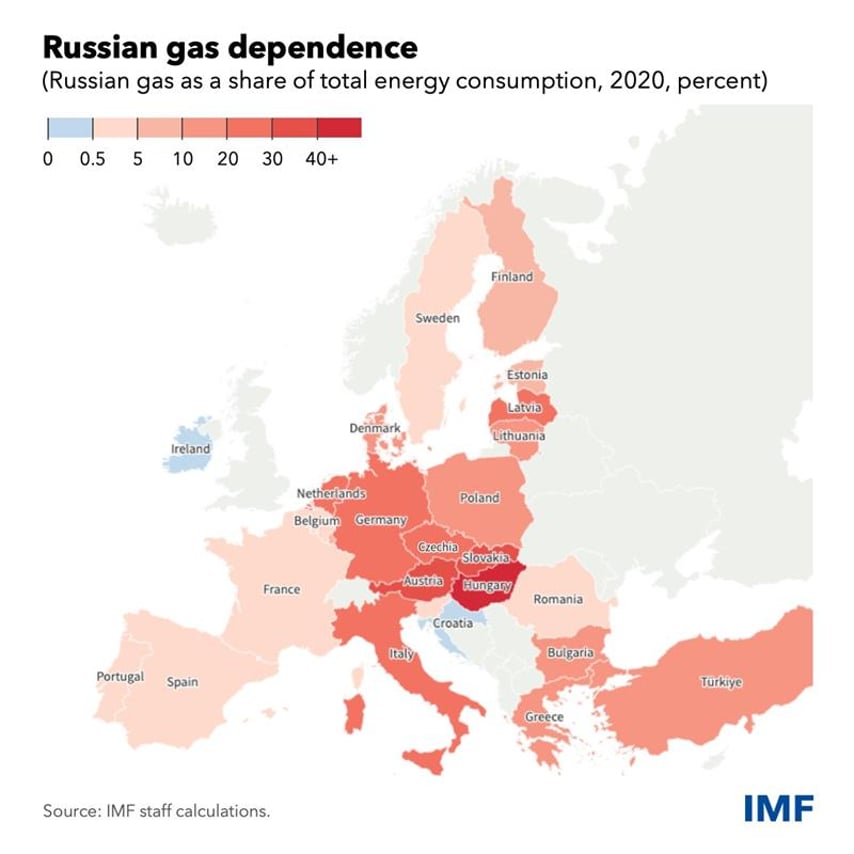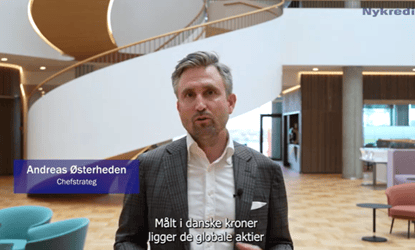ISSUE BRIEF: The Cold Winter Ahead: Understanding Europe’s Energy Crisis
Europe faces the worst energy crisis since the 1970’s, and the issue is top of mind for investors, policymakers and citizens. This issue brief takes a deep dive into the context for our investments, and explores the causes of energy inflation, the impact of energy inflation on citizens, and the industries that will be hit the hardest by rising energy costs. Faced with its high reliance on Russian gas, Europe has had to diversify its supplies preparing for the winter. The response by European governments are examined with a particular focus on Germany, the UK, the Nordics and Denmark.

Introduction
Leon Trotsky famously said: "you may not be interested in war, but war is interested in you”. War has a momentum of its own that spills across borders, forcing countries to mobilize military resources, or make decisions that accelerate societal change. While the drums of war in cities like Dnipro, Kherson and Severodonetsk may seem distant, the war is now getting increasingly real for European consumers and corporations.
Confronted with Russia’s pressure tactics in the natural gas markets, Europe now faces the worst energy crisis since 1973. We face the spectre of a widespread European energy affordability crisis, causing business foreclosures, public discontent and waning support for the sanctions against Russia.
Authorities Are Preparing For The Winter
As the smoke from forest fires covered parts of France and Spain this summer, energy planners and governments were busy preparing for a difficult winter. The EU Commission has urged member states to cut gas use by 15% between 1 August 2022 and 31 March 2023 relative to a 2017-2021 baseline[i]. The Danish Energy Authority issued an early warning in mid-July. In August, the alert came to prepare for energy rationing. Media campaigns now ask citizens and businesses to save energy where they can.
Mid-August, European energy prices reached the highest level on record[i]. In the Nordic region, prices jumped 470% between 2020 and 2021[ii]. Consumers have responded; behavior is changing and habits have been adjusted. Car owners have been lifting their feet from the pedals; speeding tickets in July dropped by 26.2 %, and Danes have been storing firewood in July, well ahead of the winter[iii] [iv].
Consumers will soon be asked to do more. The Danish government has followed Germany’s policy action, lowering public building temperatures to 19°C, asking industries and consumers to follow suit to dent the cost of rising energy prices, as heating bills can be lowered by 5% every time temperature is decreased by 1°C.
Several Factors Caused Higher Energy Prices
As is seen from the graph below, natural gas prices in Europe have doubled since the start of the year. Several key drivers have led to spiraling energy prices; an economic recovery following the pandemic has been driving energy demand. The pandemic lockdowns also caused demand for oil, gas and coal to decline, leading to lower investment levels. When the economy picked up, energy supply could not meet demand.

Gas fields in Europe have been subject to underinvestment, part of a general trend since 2015, pointed to by Goldman Sachs[i].
A cold winter in Asia in 2021 increased demand for liquified natural gas (LNG). There has been lower than average wind production in Europe, reducing availability of electricity from renewable sources, and the heatwaves drove up demand[i]. This has also been compounded by the prolonged droughts lowering water levels in European hydro dams, notably in Norway. Finally, the EU Commission has reduced the number of carbon allowances, creating a higher carbon price to force progress on the “Fit for 55” climate targets and the transition to a net zero economy[ii] [iii].
Russia Was Europe’s Biggest Natural Gas Supplier
To reach the ambitious European Green Deal’s goal of a net zero economy by 2050, the European energy system urgently needs to decarbonize its energy sources, and our use of coal had to decline. That is why Russian gas was assigned a lead role by the European Commission in January this year. Natural gas has a lower carbon footprint, making Europe more and more dependent on Russian natural gas. At the pinnacle, Europe received up to 83 percent of Russia’s total gas exports. Russia has been the dominant supplier of natural gas to Europe, delivering 41,1% of the European Union’s gas in 2019 and 26,9% of total oil supply[iv] [v].
Germany in particular had pursued a strategy of mutual interdependence. If Germany and Russia were co-dependent, Berlin saw it as unlikely that the two would become adversaries. Sadly, Putin already weaponized Russia’s gas pipelines, and penalized Europe for backing Ukraine, when he abruptly cut off gas supplies to Poland and Bulgaria on April 26.
Russia’s Windfall Profits Finances Putin’s War
Higher prices have led to higher windfall profits for the Russian state-controlled energy companies. Russian oil production is closing in on pre-war levels after months of increasing levels. Russia earned EUR 93 billion in revenue from fossil fuel exports in the first 100 days of the war. The EU imported 61% of this, equivalent to 57 billion euros. Chinas has been importing more Russian fossil fuels, and Russia's windfall profits in the energy markets and on oil in particular enables Putin to continue financing the war, dole out profits to powerful stakeholders, and secure continued public support[vi].
However, the current Russian gas infrastructure is designed mainly to supply Europe. To redirect gas to China and India is a process that will take decades. Only few pipeline connections to Asia exist today, and because the amount exported to Europe has been significantly cut, EU satellites have detected that Russia is now burning off its excess natural gas, as their underground storage capacity is full[vii].
Europe Has Forged A Series Of Gas Deals To Diversify
As part of their IEA ten point plan presented this spring, the IEA's Executive Director Fatih Birol strongly recommended
that the EU quickly diversifies its supply[i]. In fact, deals have now been made with gas exporting nations Egypt, Azerbaijan, Algeria, Nigeria, Qatar and Canada. Azerbaijan is to double gas deliveries to "at least" 20 billion cubic meters by 2027, up from 8.1 billion last year. This happens even though European human rights groups have labelled the Ilham Aliyev regime in Azerbaijan inconsistent with the EU’s values on human rights[ii].
Diversifying further to close the Russian supply gap is proving hard. Norwegian, British and North African pipelines are running at max capacity. Europe has a lot of potential for importing liquefied natural gas (LNG) in Germany, the Netherlands, the UK, Spain, and France, which helps to minimize disruptions in supply[iii]. LNG terminals are in place in the Netherlands, and Germany is working around the clock to finalize its LNG terminals on the northern coast.
The German Bundesländer Prepare for Energy Poverty
Already, the average German electricity cost has tripled between 2020 and 2022[iv]. To soften the blow of rising energy bills, German ministries have urged individuals to use less energy, but some local governments have prepared for emergencies.
One-in-four Germans have fallen into energy poverty, meaning costs for heating and lighting affect the ability to cover other expenses[v]. As a result, authorities in several states are remodeling sports facilities and vaccine centers to provide shelter for people who cannot afford to heat their homes[vi].
German Industries Are Scaling Down Production
Industrial production consumed a third of Germany’s imported natural gas from Russia. Citizens in East German industrial cities Dresden, Leipzig, Dessau, Cottbus, and Chemnitz will face a tough winter. In Western Germany, the Rhine-Ruhr region’s cities such as Cologne, Dortmund and Dusseldorf struggle to absorb electricity highs[vii].
A steep reduction in gas consumption could help to keep German energy intensive sectors operational, and could be further enabled by a reallocation of available gas reserves[viii]. Yet, some German industries have already begun scaling down production. Energy-intensive industries such as chemicals, steel, paper, glass, manufacturing and metals are warning of negative “knock-on” effects for the whole German economy[ix].
To remedy inflation, governments, industry trade organizations and corporations are collaborating; public-private deals have been made to incentivize energy saving action. German heavy industry is asked to cut their energy costs, and federal government will provide financial support[x].
Energy Inflationary Impact On Industries And Consumers Will Vary Across Europe
The IMF predicts that some European countries would be plunged into recession, with GDP in Hungary, Slovakia and Czech Republic expected to fall by up to 6%, with Italy, Germany and Austria also being hit hard, due to their high dependency on Russian gas, as is seen from the map[i] [ii].

Energy Affordability Is A Major Theme In The UK
In the UK, inflation jumped to a 40-year high of 10.1% in July as food and energy costs climbed further, aggravating the country's cost of living crisis[i]. Experts are warning that insolvencies could rise for small business owners through the winter. Thousands of cafes, restaurants, shops now struggle with energy inflation[ii].
The new Truss government has announced that it will freeze the £2500 cap on UK energy bills for a period of up to two years. This prevents the planned 80% increase in energy bills that was set to go into effect on October 1st. Prime Minister Truss plans to offer the same level of support to businesses as it does to consumers for a period of six months. After that, the government will provide support to the most vulnerable industries[iii].
Avoiding Liquidity Traps: Government Guarantees For Energy Utilities
Since the start of Europe's energy crisis, governments in Germany, France, Italy and Spain each provided €20 billion in government aid to reduce gas and electricity costs, putting a strain on public budgets[iv] [v]. One of Germany’s large gas utilities, Uniper, that has transmitted 40% of the country’s gas, has been incurring massive losses, leading to a liquidity crisis for the company. On September 22, the German government nationalized Uniper following a dwindling supply of Russian natural gas and price spikes[vi].
Many European power distributors could be at risk, hit by caps that limit the price rises that can be passed to consumers. To avoid liquidity traps and a European “Lehman moment”, governments are providing guarantees. Finland has aimed to offer 10 billion euros ($10 billion) and Sweden 250 billion Swedish crowns ($23 billion) in liquidity guarantees to their power companies. A broad political September agreement has ensured Danish energy companies a 100 billion DKK liquidity guarantee.
In September, fifteen countries, including France, Italy and Poland asked Brussels to propose a price cap or price range on all wholesale gas transactions to bring the price down for the consumers hit hardest by rising energy costs, but such an operation would be costly for the governments.
A Long Twilight Struggle
European governments and industries face hard choices with higher energy costs and rising inflation levels, harming both small business owners and households.
Europe has responded through a major, concerted effort by cutting its share of Russian gas from 40% to 9% of overall gas imports. Such dramatic change is not normal in the energy sector. Changes tend to occur gradually, as the energy infrastructure we enjoy today is the result of 70 years of planning decisions. Now, the energy crisis will force a rapid roll-out of natural gas substitutes.
Climate friendly solutions such as heat pumps, energy efficiency, solar parks, wind farms, green hydrogen and biomethane will be part of a broader and more urgent energy security investment program with major benefits.
Here, we just recall what the International Energy Agency Executive Director Fatih Birol said on May 18, 2021 when their net zero plan was presented: “Our net zero pathway sees a historic surge in clean energy investment to $4 trillion in 2030. This creates millions of jobs and helps lift global economic growth by 0.4 percentage points a year in the 2020s”[i].
While Europe has been drawn into a protracted twilight struggle with Putin’s Russia, accelerating the clean energy transition is a massive opportunity, and electrification, energy infrastructure and clean energy transformation will be central themes for investors.
In the next issue brief, we dive deeper into Europe’s Green Deal plans for decarbonization, and the progress made over the last year.
Du kan downloade artiklen her
https://www.esm.europa.eu/blog/cold-winter-ahead-implications-russian-gas-cut-euro-area#_ftn6
Det vil gøre nas. Men vi kan godt leve uden Putins olie og gas (zetland.dk)
Europe Power Prices Hit Record in 2021 With Little Sign of Relief Into 2022 - Bloomberg
Der er færre fartsyndere på de danske motorveje | Vejdirektoratet
Source: Refinitiv Eikon, Datastream (Retrieved October 4, 2022)
After Long Decline, Oil and Gas Investing is Poised to Boom (goldmansachs.com)
What is the EU ETS? - European Commission (europa.eu)
What happens in Ireland if Russia turns off the gas supply? (rte.ie)
https://www.bruegel.org/comment/europe-must-get-serious-about-cutting-oil-and-gas-use
Commission readies EU energy rethink following Ukraine war (energymonitor.ai)
https://www.dawn.com/news/1708810
International Energy Agency says Europe must slash gas demand before hard winter – The Irish Times
https://time.com/6200523/europe-russia-gas-future/
What happens in Ireland if Russia turns off the gas supply? (rte.ie)
Europe Power Prices Hit Record in 2021 With Little Sign of Relief Into 2022 - Bloomberg
Germany Heading to Gas Emergency With Russia Keeping Nord Stream Flows Reduced - Bloomberg
Germany bracing itself for ‘nightmare’ energy scenario – The Irish Times
https://www.ft.com/content/07df3f2e-6991-4842-a047-41f2b6fb853d
https://blogs.imf.org/wp-content/uploads/2022/07/Russia-Gas-Blog-Map.jpg
UK inflation hits 10.1%, driven by soaring food and fuel prices | Inflation | The Guardian
Massive energy bill hikes put hundreds of thousands of businesses under threat | The Independent
https://foreignpolicy.com/2022/07/22/russia-economy-sanctions-myths-ruble-business/
Europe must get serious about cutting oil and gas use (bruegel.org)
https://twitter.com/fbirol/status/1394518259261710337?lang=en


